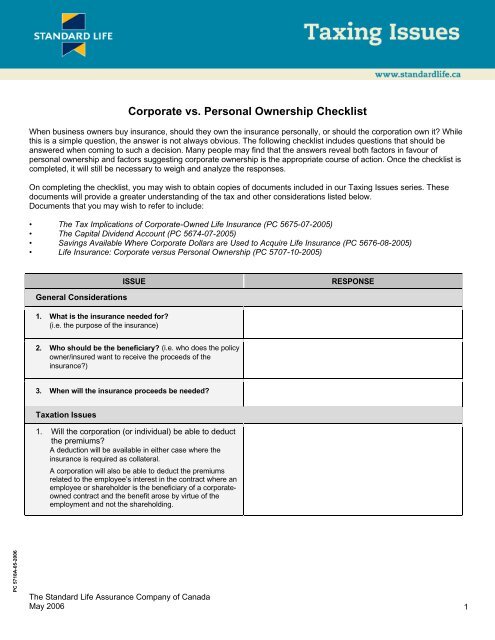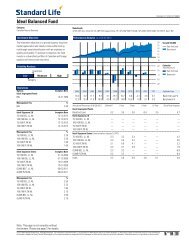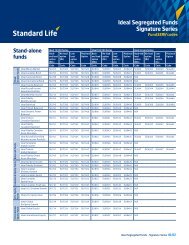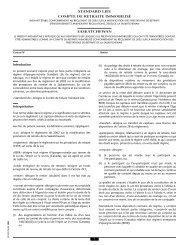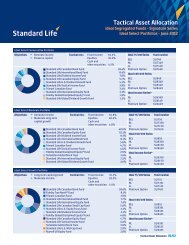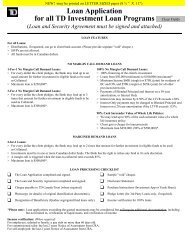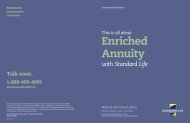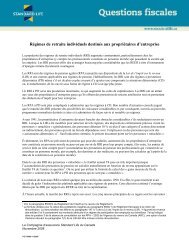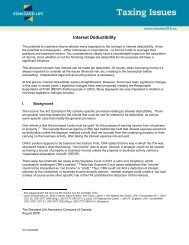Corporate vs. Personal Ownership Checklist - Standard Life
Corporate vs. Personal Ownership Checklist - Standard Life
Corporate vs. Personal Ownership Checklist - Standard Life
Create successful ePaper yourself
Turn your PDF publications into a flip-book with our unique Google optimized e-Paper software.
PC 5718A-05-2006<br />
<strong>Corporate</strong> <strong>vs</strong>. <strong>Personal</strong> <strong>Ownership</strong> <strong>Checklist</strong><br />
When business owners buy insurance, should they own the insurance personally, or should the corporation own it? While<br />
this is a simple question, the answer is not always obvious. The following checklist includes questions that should be<br />
answered when coming to such a decision. Many people may find that the answers reveal both factors in favour of<br />
personal ownership and factors suggesting corporate ownership is the appropriate course of action. Once the checklist is<br />
completed, it will still be necessary to weigh and analyze the responses.<br />
On completing the checklist, you may wish to obtain copies of documents included in our Taxing Issues series. These<br />
documents will provide a greater understanding of the tax and other considerations listed below.<br />
Documents that you may wish to refer to include:<br />
• The Tax Implications of <strong>Corporate</strong>-Owned <strong>Life</strong> Insurance (PC 5675-07-2005)<br />
• The Capital Dividend Account (PC 5674-07-2005)<br />
• Savings Available Where <strong>Corporate</strong> Dollars are Used to Acquire <strong>Life</strong> Insurance (PC 5676-08-2005)<br />
• <strong>Life</strong> Insurance: <strong>Corporate</strong> versus <strong>Personal</strong> <strong>Ownership</strong> (PC 5707-10-2005)<br />
General Considerations<br />
1. What is the insurance needed for?<br />
(i.e. the purpose of the insurance)<br />
ISSUE RESPONSE<br />
2. Who should be the beneficiary? (i.e. who does the policy<br />
owner/insured want to receive the proceeds of the<br />
insurance?)<br />
3. When will the insurance proceeds be needed?<br />
Taxation Issues<br />
1. Will the corporation (or individual) be able to deduct<br />
the premiums?<br />
A deduction will be available in either case where the<br />
insurance is required as collateral.<br />
A corporation will also be able to deduct the premiums<br />
related to the employee’s interest in the contract where an<br />
employee or shareholder is the beneficiary of a corporateowned<br />
contract and the benefit arose by virtue of the<br />
employment and not the shareholding.<br />
The <strong>Standard</strong> <strong>Life</strong> Assurance Company of Canada<br />
May 2006 1
Taxation Issues (continued)<br />
ISSUE RESPONSE<br />
2. If the insurance is corporate-owned, will this result<br />
in either an employee or shareholder benefit?<br />
A benefit would be computed where a shareholder or<br />
employee is the beneficiary.<br />
Where a person is both a shareholder and an employee,<br />
a determination will have to be made as to the capacity<br />
in which the benefit was received.<br />
Shareholder benefits are not deductible to a corporation,<br />
whereas employee benefits are.<br />
3. If the corporation is the beneficiary, will it be able to<br />
credit the life insurance death proceeds to its<br />
Capital Dividend Account (CDA)?<br />
Is the corporation a private corporation that will have<br />
access to the CDA?<br />
Are the shareholders resident in Canada so that any<br />
Capital Dividend will be tax-free?<br />
Is the individual(s) who is to receive the death benefit a<br />
shareholder of the corporation?<br />
Is the calculation of the Capital Dividend clear, or are<br />
there issues in calculating the amount that may be<br />
credited to the CDA? If so, should multiple dividends be<br />
declared?<br />
Is there a process in place for making the appropriate<br />
Capital Dividend elections on a timely basis?<br />
4. Will corporate ownership of the life insurance policy<br />
eliminate access to the $500,000 capital gains<br />
exemption?<br />
If the insurance is corporate-owned, can it be considered<br />
to be used in a Canadian active business?<br />
How will ownership of the insurance impact the 50% and<br />
90% tests?<br />
If there are risks with respect to meeting the 50% or 90%<br />
tests, does it make sense to have the insurance in<br />
another corporation?<br />
The <strong>Standard</strong> <strong>Life</strong> Assurance Company of Canada<br />
May 2006 2
ISSUE RESPONSE<br />
5. How should any corporate-owned insurance be<br />
valued<br />
(a) At death<br />
(b) For purposes of accessing the $500,000 capital<br />
gains exemption?<br />
Will it be permissible to value the policy at death at its<br />
Cash Surrender Value (CSV)?<br />
If the policies are multi-life or joint-life policies, how will<br />
the FMV at death be established?<br />
What is the impact of Canada Revenue Agency’s (CRA)<br />
general valuation rules?<br />
If the purpose of the insurance is to fund a buy-sell<br />
agreement, will the purchase, redemption or cancellation<br />
take place within 24 months of death so that the CSV<br />
may be used as the FMV?<br />
6. Could the deemed Retirement Compensation<br />
Arrangement (RCA) rules come into play?<br />
Is there any risk that CRA might contend that it is<br />
reasonable to consider that the insurance was acquired<br />
to fund (in whole or part) retirement or other postemployment<br />
benefits?<br />
If so, is there an administrative process in place to<br />
comply with the ITA requirements?<br />
7. If a corporation is providing retirement or other<br />
benefits, should an RCA be considered?<br />
If an RCA is being established and benefits are to be<br />
provided, is it appropriate to have the ownership of the<br />
insurance contract split?<br />
8. Will be policy be leveraged?<br />
Will the interest be deductible?<br />
If so, will this change if the October 31, 2003 measures<br />
are adopted?<br />
If the leveraging is only attractive because of interest<br />
deductibility, what happens if interest deductibility were<br />
to be eliminated, either because of the October 31, 2003<br />
measures (Reasonable Expectation of Profit, REOP,<br />
rules) or other modifications to these rules (per the<br />
announcement in the 2005 Federal Budget)?<br />
The <strong>Standard</strong> <strong>Life</strong> Assurance Company of Canada<br />
May 2006 3
9. Is a departure from Canada imminent?<br />
ISSUE RESPONSE<br />
Might an RCA be implemented? Amounts then payable to<br />
non-residents are subject to Canadian non-resident<br />
withholding taxes of only 15% or 25%.<br />
Is corporate-owned insurance (where owned by a private<br />
corporation) less attractive than personally owned<br />
insurance because of “departure tax” considerations?<br />
(i.e. assets that are deemed disposed of upon leaving<br />
Canada exclude a “life insurance policy in Canada” that is<br />
personally held, but include shares of private<br />
corporations, with the FMV of the shares taking into<br />
account the value of any life insurance held by the<br />
corporation. Value will be CSV, except for joint-life and<br />
multi-life contracts).<br />
10. Will there be an on-going insurance need?<br />
Might there be a transfer in the ownership of the<br />
policy?<br />
If there is a high likelihood that the policy will be<br />
transferred, will the tax consequences be significant?<br />
(e.g. Will a significant policy gain have to be recognized?<br />
Will shareholder benefits arise? What is the ACB after the<br />
transfer?)<br />
11. In a corporate situation, was there a shareholder<br />
agreement in place on April 26, 1995, which dealt with<br />
the share disposition?<br />
In such a situation, corporate owned insurance may be<br />
appropriate because the shares are “grandfathered,” i.e.,<br />
not subject to the “stop loss” rules. Thus, new or<br />
additional corporate-owned insurance may be acquired<br />
(or the existing policy may be replaced or converted).<br />
12. Was the corporation a beneficiary of a life insurance<br />
policy on April 26, 1995 that insured the life of an<br />
individual (or his or her spouse), where it was<br />
reasonable to conclude that a main purpose of the<br />
insurance was to fund the redemption, acquisition or<br />
cancellation of shares?<br />
This may also allow the corporation to acquire new or<br />
additional life insurance, or to replace or convert an<br />
existing policy, without the “stop loss” rules applying.<br />
The <strong>Standard</strong> <strong>Life</strong> Assurance Company of Canada<br />
May 2006 4
13. Is there the potential that US estate taxes may<br />
apply?<br />
ISSUE RESPONSE<br />
Would the life insurance proceeds be subject to US<br />
estate taxes?<br />
14. Should a shared ownership structure be<br />
considered? (i.e. one party would own death benefit<br />
component and other party would own investment<br />
component of UL contract).<br />
Can the interests of the parties be appropriately<br />
segregated, so that each could own a separate<br />
component of the UL contract?<br />
If so, is there a methodology to share costs, so<br />
employer/shareholder benefits are avoided, with each<br />
party paying an appropriate portion of the costs?<br />
15. Will corporate ownership have an impact on capital<br />
taxes or the Large Corporations Taxes?<br />
Accounting & Administrative Concerns<br />
1. If the insurance is corporate-owned, is there a<br />
process in place so the appropriate values can be<br />
shown on the corporation’s financial statements?<br />
Will the corporation be able to access the CSV<br />
information on a timely basis so that the financial and tax<br />
return deadlines may be met?<br />
2. Is the insurance being put in place to fund a buy-sell<br />
agreement?<br />
Is corporate ownership preferred because the<br />
corporation has the administrative processes in place to<br />
ensure that the policies are kept in force?<br />
If there are multiple shareholders, is corporate<br />
ownership preferred because the shareholders will not<br />
have to pay varying amounts of insurance premiums<br />
because their ages and/or health vary?<br />
For multiple shareholders and corporate ownership,<br />
should other than a multi-life contract be considered<br />
because of the CDA implications?<br />
The <strong>Standard</strong> <strong>Life</strong> Assurance Company of Canada<br />
May 2006 5
ISSUE RESPONSE<br />
3. If the contract has an investment component, who<br />
will direct the investments?<br />
If there are various parties to the contract, who will make<br />
the investment decisions?<br />
If, for example, the contract is corporate-owned and<br />
insured is one of many shareholders, is it appropriate to<br />
have the shareholder or another officer of the<br />
corporation direct investments, especially where<br />
investment performance may have a bearing of future<br />
premium payments?<br />
Creditor Protection & Family Law Concerns<br />
1. Are there creditor protection concerns?<br />
If the insurance is corporate-owned, is there the<br />
likelihood that creditors would lay claim to it?<br />
If the insurance is to be personally owned, will it enjoy<br />
the protection provided by the provincial insurance<br />
legislation?<br />
In common law provinces, is there the appropriate family<br />
relationship between the life insured and the designated<br />
beneficiary? In Quebec, is there the appropriate<br />
relationship between the owner and the beneficiary?<br />
2. Are there any family law concerns?<br />
Will insurance proceeds (or a right to proceeds) enter<br />
into the calculation of matrimonial property that is subject<br />
to division? Does this create a bias for a personally<br />
owned policy?<br />
Other concerns<br />
1. Are there other considerations that have not already<br />
been noted above?<br />
This document is intended for general information only. It should not be construed as legal, accounting, tax or specific<br />
investment advice. Clients should consult a professional advisor concerning their situations and any specific investment<br />
matters. While reasonable steps have been taken to ensure that this information was accurate as of the date hereof, The<br />
<strong>Standard</strong> <strong>Life</strong> Assurance Company of Canada and its affiliates make no representation or warranty as to the accuracy of<br />
this information and assume no responsibility for reliance upon it.<br />
The <strong>Standard</strong> <strong>Life</strong> Assurance Company of Canada<br />
May 2006 6


